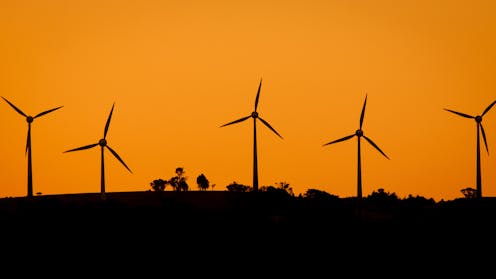The Queensland government is cancelling renewable energy projects. Can the state still reach net zero?
- Written by The Conversation

On the surface, Queensland’s new government is doing exactly what it pledged before winning office in October – repealing the state’s ambitious renewable energy targets and cancelling a huge pumped hydro project near Mackay.
But since the start of the year, the Crisafulli LNP government has gone further, and it’s less clear where it’s heading.
Last week, the government abruptly cancelled the A$1 billion Moonlight Ridge wind farm proposal, citing insufficient consultation and a lack of community support.
At the same time, the government announced it would open another 16,000 square kilometres of the state for gas exploration. The government is also planning to open new gas peaking plants and keep its coal plants open longer.
So, is the Queensland government backsliding on renewables and climate change?
The Crisafulli government is still committed to net zero by 2050. Because Queensland still owns its own transmission infrastructure and power plants, the state could shift to clean energy faster than other states. But at present, they don’t appear to be in a rush.
Slowdown under way
Previous Labor governments in Queensland announced plans for large pumped hydro installations as a way to store energy to be available when intermittent wind and solar are not. The largest of these pumped hydro projects was the Pioneer-Burdekin proposal near Mackay, which the government has now canned.
The Crisafulli government has also asked the Queensland Investment Corporation to examine the financial viability of two other major proposals, the Borumba pumped hydro scheme inland from the Sunshine Coast and the Copperstring transmission project linking Townsville and Mount Isa. This isn’t unusual – new governments often review projects announced by their predecessors.
Another recent announcement is drawing stronger criticism, however. In April, the Crisafulli government announced plans to make sure large solar and wind farms have the social licence to operate. This, the government announced, would bring the “same rigorous approval processes as other major developments” to bear on renewables.
If these plans become law, they are likely to make it substantially harder and slower to build large renewables projects.
The cancellation of the Moonlight Ridge wind farm proposal is instructive. Of the 508 individuals who wrote in response to the development, only 142 were local. In his decision, planning minister Jarrod Bleijie noted: “the representations that I received evidence that the project has not acquired overriding community acceptance”.
What’s being proposed looks messy. The peak body for renewables in Queensland is highly sceptical, while miners and farmers have also signalled concern.
But while the Moonlight Ridge cancellation drew headlines, two other wind farm proposals have been approved after being asked to show they had consulted adequately.
No is easy, yes is hard
It’s easy to take office and reject the work of predecessors. It’s far harder to outline what will replace it.
In contrast to other east coast states, Queensland has largely kept control of its sprawling electricity system. The government owns most large coal and gas power plants and all the transmission infrastructure.
While the new government has indicated renewed support for private sector energy investment, it has provided support for government-owned corporations to develop new gas peaker plants. By contrast, there are very few proposals for new gas plants further south.
In one sense, it’s no surprise Queensland’s new government has eased off on renewables. Its coal plants are relatively new, and largely owned by the government. This may reduce the urgency for developing a new energy plan, but only for a few years. Planning for a smooth energy transition is a major task, as demonstrated by southern states.
The state has also profited hugely from gas exported from Gladstone. The government now receives around $1 billion from oil and gas royalties a year.
Go-fast federally, go-slow at state?
The thumping Labor majority at this year’s federal election means, at a national level, work on the clean energy transition will accelerate. But this transition is only possible if state and federal governments coordinate well.
The responsibility for building and maintaining electricity systems in Australia largely falls to the states and territories. But managing large power grids on the east and west coasts requires national-level coordination.
What the federal government can do, by and large, is set a goal and stump up the cash. As former Labor prime minister Paul Keating once quipped, “never get between a state premier and a bucket of money”.
The federal government is running a funding program to support renewable generation and storage projects across the country. Three Queensland renewable projects have been approved under this program, including solar farms with battery storage.
It’s hard to see the state government moving to block these projects.
Where does this leave us?
Queensland is signalling it’s not enthused about having an open gate for new renewable projects. Adding time consuming and expensive new consultation hurdles may cause prospective renewable developers to pack up and head south or west.
Yet the policy’s strategic intent is unclear and is not necessarily against clean energy for the state. Many projects are already under way. The Crisafulli government has shown interest in smaller scale pumped hydro schemes as a way to store energy. And gas peaking plants will be a necessary evil in a high-renewables grid, acting like an emergency diesel generator for the rare periods without enough wind, sun or water.
The big test will come later this year in the form of the state government’s five year energy plan. Will it deliver the investment to meet the net zero objective while maintaining affordable and reliable power? Right now, many in the clean energy industry are taking a wait-and-see attitude.







